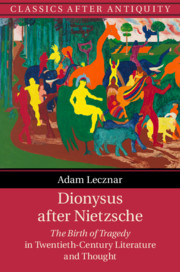Book contents
- Dionysus after Nietzsche
- Classics after Antiquity
- Dionysus after Nietzsche
- Copyright page
- Epigraph
- Contents
- Series Editors’ Preface
- Acknowledgements and Dedication
- Introduction
- Chapter 1 Corybants, Satyrs and Bulls
- Chapter 2 A Great Kick at Misery
- Chapter 3 In Search of an Absent God
- Chapter 4 What Oedipus Knew
- Chapter 5 Dionysus in Yorubaland
- Conclusion
- Bibliography
- Index
Chapter 2 - A Great Kick at Misery
D. H. Lawrence
Published online by Cambridge University Press: 27 March 2020
- Dionysus after Nietzsche
- Classics after Antiquity
- Dionysus after Nietzsche
- Copyright page
- Epigraph
- Contents
- Series Editors’ Preface
- Acknowledgements and Dedication
- Introduction
- Chapter 1 Corybants, Satyrs and Bulls
- Chapter 2 A Great Kick at Misery
- Chapter 3 In Search of an Absent God
- Chapter 4 What Oedipus Knew
- Chapter 5 Dionysus in Yorubaland
- Conclusion
- Bibliography
- Index
Summary
This chapter examines the antagonistic relationship with Nietzsche’s Greeks that was managed by one of the main writers of modernism, D. H. Lawrence. By thinking about the position of Nietzsche in the British intellectual climate of the early twentieth century, and in particular his association to the anti-Germanic feeling surrounding the First World War, this chapter contextualises the tension between Lawrence’s antipathy towards Nietzsche and the clear resonances between the two authors’ attitudes towards the irrational nature of ancient Greece. The chapter examines the differing attitudes towards tragedy that Lawrence puts forward across his voluminous writings, including especially his 1920 novel Women in Love, his critical-theoretical essay ‘Study of Thomas Hardy’ (written 1914/1915, published posthumously in 1946), and his travel writings about his visits to Etruscan tombs. It uses the idea of the ‘gay science’, which Lawrence took from Nietzsche’s work of the same name from 1882, to situate Lawrence’s desire to establish an anti-tragic form of art and literature with a genealogy that stretches back to antiquity.
- Type
- Chapter
- Information
- Dionysus after Nietzsche<I>The Birth of Tragedy</I> in Twentieth-Century Literature and Thought, pp. 68 - 98Publisher: Cambridge University PressPrint publication year: 2020



